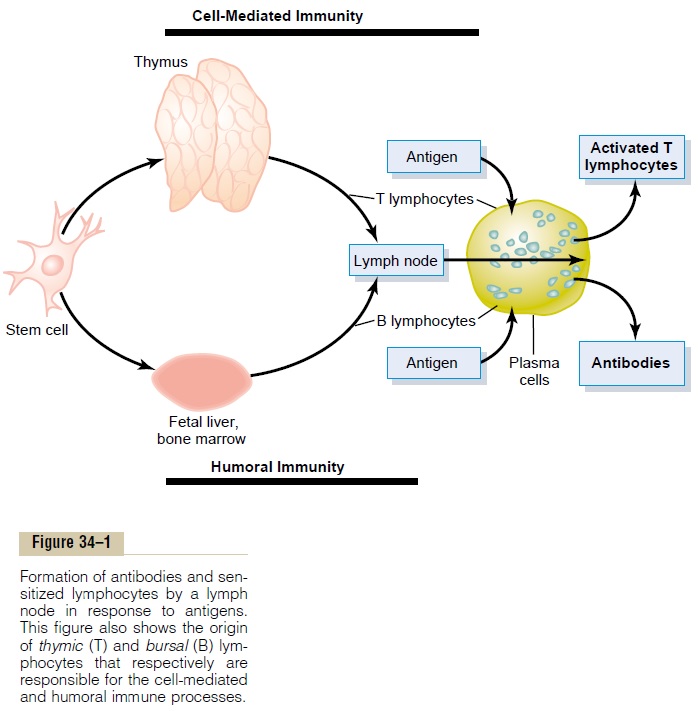Chapter: Medical Physiology: Resistance of the Body to Infection: II. Immunity and Allergy
Acquired (Adaptive) Immunity
Acquired (Adaptive) Immunity
In addition to its generalized innate immunity, the human body has the ability to develop extremely powerful specific immunity against individual invading agents such as lethal bacteria, viruses, toxins, and even foreign tissues from other animals. This is calledacquired or adaptive immunity. Acquired immunity is caused by a special immune system that forms antibodies and/or activated lym-phocytes that attack and destroy the specific invading organism or toxin. It is with this acquired immunity mechanism and some of its associated reactions.
Acquired immunity can often bestow extreme protection. For instance, certain toxins, such as the paralytic botulinum toxin or the tetanizing toxin of tetanus, can be protected against in doses as high as 100,000 times the amount that would be lethal without immunity. This is the reason the treatment process known as immunization is so important in protecting human beings against disease and against toxins.
Basic Types of Acquired Immunity
Two basic but closely allied types of acquired immu-nity occur in the body. In one of these the body develops circulating antibodies,which are globulin molecules in the blood plasma that are capable of attacking the invading agent. This type of immunity is calledhumoral immunity or B-cell immunity (because B lymphocytes produce the antibodies). The second type of acquired immunity is achieved through the formation of large numbers of activated T lymphocytes that are specifically crafted in the lymph nodes to destroy the foreign agent. This type of immunity is called cell-mediated immunity or T-cell immunity (because the activated lymphocytes are T lympho-cytes). We shall see shortly that both the antibodies and the activated lymphocytes are formed in the lym-phoid tissues of the body. Let us discuss the initiation of the immune process by antigens.
Both Types of Acquired Immunity Are Initiated by Antigens
Because acquired immunity does not develop until after invasion by a foreign organism or toxin, it is clear that the body must have some mechanism for recog-nizing this invasion. Each toxin or each type of organ-ism almost always contains one or more specific chemical compounds in its makeup that are different from all other compounds. In general, these are pro-teins or large polysaccharides, and it is they that initi-ate the acquired immunity. These substances are called antigens (antibody generations).
For a substance to be antigenic, it usually must have a high molecular weight, 8000 or greater. Furthermore, the process of antigenicity usually depends on regu-larly recurring molecular groups, called epitopes, on the surface of the large molecule. This also explains why proteins and large polysaccharides are almost always antigenic, because both of these have this ster-eochemical characteristic.
Lymphocytes Are Responsible for Acquired Immunity
Acquired immunity is the product of the body’s lym-phocytes. In people who have a genetic lack of lym-phocytes or whose lymphocytes have been destroyed by radiation or chemicals, no acquired immunity can develop. And within days after birth, such a person dies of fulminating bacterial infection unless treated by heroic measures. Therefore, it is clear that the lym-phocytes are essential to survival of the human being.
The lymphocytes are located most extensively in the lymph nodes, but they are also found in special lym-phoid tissues such as thespleen, submucosal areas of the gastrointestinal tract, thymus, and bone marrow.The lymphoid tissue is distributed advantageously in the body to intercept invading organisms or toxins before they can spread too widely.
In most instances, the invading agent first enters the tissue fluids and then is carried by way of lymph vessels to the lymph node or other lymphoid tissue. For instance, the lymphoid tissue of the gastrointestinal walls is exposed immediately to antigens invading from the gut. The lymphoid tissue of the throat and pharynx (the tonsils and adenoids) is well located to intercept antigens that enter by way of the upper res-piratory tract. The lymphoid tissue in the lymph nodes is exposed to antigens that invade the peripheral tissues of the body. And, finally, the lymphoid tissue of the spleen, thymus, and bone marrow plays the specific role of intercepting antigenic agents that have suc-ceeded in reaching the circulating blood.
Two Types of Lymphocytes Promote “Cell-Mediated” Immunity or “Humoral” Immunity—the T and the B Lymphocytes.Although most lymphocytes in normal lymphoid tissue look alike when studied under the microscope, these cells are distinctly divided into two major populations. One of the populations, the T lympho-cytes, is responsible for forming the activated lympho-cytes that provide “cell-mediated” immunity, and the other population, the B lymphocytes, is responsible for forming antibodies that provide “humoral” immunity.
Both types of lymphocytes are derived originally in the embryo from pluripotent hematopoietic stem cells that form lymphocytes as one of their most important offspring as they differentiate. Almost all of the lym-phocytes that are formed eventually end up in the lymphoid tissue, but before doing so, they are further differentiated or “preprocessed” in the following ways.
The lymphocytes that are destined to eventually form activated T lymphocytes first migrate to and are preprocessed in the thymusgland, and thus they are called “T” lymphocytes to designate the role of the thymus. They are responsible for cell-mediated immunity.
The other population of lymphocytes—the B lym-phocytes that are destined to form antibodies—are preprocessed in the liver during midfetal life and in the bone marrow in late fetal life and after birth. This pop-ulation of cells was first discovered in birds, which have a special preprocessing organ called the bursa of Fabri-cius. For this reason, these lymphocytes are called “B” lymphocytes to designate the role of the bursa, andthey are responsible for humoral immunity. Figure 34–1 shows the two lymphocyte systems for the for-mation, respectively, of (1) the activated T lympho-cytes and (2) the antibodies.

Related Topics